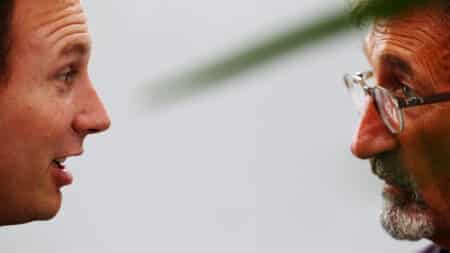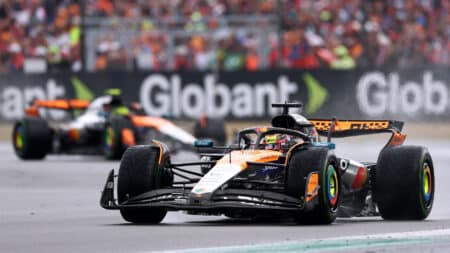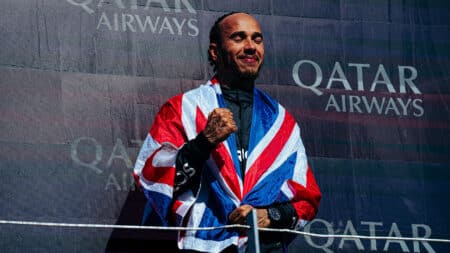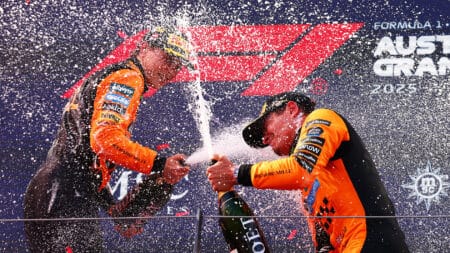
Horner's departure shows age of the maverick F1 boss is over
Christian Horner has now left Red Bull, the last of a certain breed of F1 team principal
By Anthony Peacock
Frenchman Sébastien Ogier, in the debut year of the Volkswagen Polo R WRC, won nine rallies en route to his first world title, but if Sébastien Loeb had been able to get his way, that total would probably have been 11.

Click here to download a high-resolution wallpaper of this image
The nine-time World Rally Champion didn’t want to do any rallies at all this season, but was persuaded by Citroen to embark on four events: Monte Carlo, Sweden, Argentina and – fittingly – France, to mark his farewell.
Incredibly, by the mid-point of the season, Loeb was still Citroën’s highest point-scorer – which either goes to show just how good he is or what an Icarus-like dive the fortunes of the previously all-conquering Citroën team had taken. Probably both.
In any case, Volkswagen laid down a marker by winning their very first stage in Monte Carlo with a World Rally Car (courtesy of Ogier) and that rather set the tone for the rest of the season, with 10 of the 13 winner’s trophies heading back to Hanover. M-Sport’s principal Malcolm Wilson was one of many to glumly reflect that Ogier was looking likely to dominate the sport over the next decade in the same way that Loeb had.
But there’s a strong argument for saying that Wilson’s lead driver, Thierry Neuville, did an even more outstanding job than Ogier this year.
Volkswagen had the luxury of the same sort of budget that Audi spends on endurance racing as well as more than a year’s testing with experienced drivers.
Following Ford’s shock withdrawal from the WRC at the end of last year, M-Sport (which has run the factory Ford programme since 1997) didn’t even know they were competing until a handful of weeks before Monte Carlo.
Having hastily assembled a minimalist sponsorship package and cut costs in every area, Wilson only managed to conclude a deal with Neuville while the young Belgian was already at the Citroen pre-season training camp.
It was a major coup that paid off, because the 25-year-old Neuville – with just a year’s experience of the World Rally Championship behind him – managed to rack up seven podiums and came close to winning on more than one occasion.
There’s absolutely no way, for example, he should have beaten Volkswagen’s Jari-Matti Latvala – touted by many as the fastest driver in the championship, with the best car – to runner-up in the overall standings. And yet it happened.
This was probably M-Sport’s strongest performance yet: including the Ford-bankrolled years that featured experienced drivers of the calibre of Colin McRae and Carlos Sainz. What could the team have done with some proper money behind them this year? We’ll never know.
Latvala didn’t destroy any cars this year – the flip side to his blinding natural speed – but was curiously off the pace. Part of that was because he had to quickly adapt to an all-new car (having only signed for Volkswagen at the end of last year) and he also suffered an outbreak of Mark Webber syndrome: where the lion’s share of mechanical misfortune comes your way while your dominant team mate cruises serenely off into the distance. Just like Mark Webber, Latvala is also an extremely nice guy. So maybe there’s a moral in that?
This year, the jury still has to be out on Latvala. Next year he absolutely must take the fight to Ogier or become a perpetual number two.
Which leads us neatly to Dani Sordo, who justified his existence at Citroën by taking his first win on the 106th attempt, in Germany. The Spaniard was employed as a support act to Mikko Hirvonen, but in that respect he outclassed the full-time team leader, who endured his first season without a win since 2005.
That’s probably why Citroën looked at various options for the future in the latter half of the season, with Kris Meeke joining the factory squad in Finland and Australia, while former F1 star Robert Kubica – the winner of the WRC2 title this year – stepped up to the main team for Wales Rally GB.
More on rallying
A passion for Martini Racing
WRC shows positive signs in Sweden
‘Super Séb’ Loeb
Mark Thatcher lost on Dakar Rally
Monte Carlo or bust?
It ended in at least one accident on every occasion, but crucially they both showed plenty of speed: a commodity on the whole lacking in any Citroën driver this year who wasn’t called Sébastien Loeb. The team kept trying to persuade Loeb to expand his programme throughout the year, but the 39-year-old simply wasn’t having it – although he did consider doing Germany before canning the idea (much to Sordo’s undoubted relief).
The final round of the season in Wales, still known by everyone as ‘the RAC Rally’, underwent a major shake-up with the stages moving north and the base to Deeside. Despite nobody knowing where exactly that was – North Wales would have been a far better description – the event was a sell-out success over some iconic roads, reminiscent of the halcyon days of McRae versus Burns. The only disappointment was the repeated failure of the timing system (attributed this time to a cyber attack): a leitmotif of the year right from the very beginning.
The contract, taken over by Spanish firm SIT at the start of the season, is being run on a much smaller budget than before but it also incorporates tracking – which clearly has a direct impact on safety because this is what alerts emergency services to an incident and pinpoints its exact location. And that’s an area where economic considerations should never become a factor.

Christian Horner has now left Red Bull, the last of a certain breed of F1 team principal

Was Oscar Piastri the real winner in the long run after Silverstone? asks James Elson

Lewis Hamilton hadn't won in almost three years – and then produced a sensational victory at Silverstone 2024. James Elson explains why it was his best ever

Describing this year's championship race as a 'battle' might be slightly over-egging it, writes James Elson